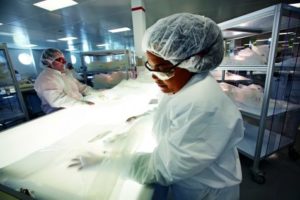 In an article published by BioProcess International, visible particulate matter in single-use systems (SUS) is stated to be a big concern. SUS is a product/equipment designed to be used once; it is primarily composed of plastic that can be discarded easily. It is necessary when creating products with SUS, the parenteral drugs must be “essentially free” from visible particulate matter. The term “essentially free” is defined in USP <790>.
In an article published by BioProcess International, visible particulate matter in single-use systems (SUS) is stated to be a big concern. SUS is a product/equipment designed to be used once; it is primarily composed of plastic that can be discarded easily. It is necessary when creating products with SUS, the parenteral drugs must be “essentially free” from visible particulate matter. The term “essentially free” is defined in USP <790>.
When producing parenterals, it is important to control reactions between the product and the SUS surface. Any matter stuck to the surface of SUS, could wash off and contaminate the drug product. There are purification steps that are needed to be taken throughout the entire manufacturing process. The final product of the drug could be at risk for particulate matter depending on when the drug formulation is combined with the formulation of SUS.
Manufacturing of SUS components and assemblies in cleanrooms will reduce particulate matter risks. SUS products are constantly checked for particles to ensure that they are “essentially free” of particles. Although, the turbidity of visual inspections could irritate the interior surface. Particles less than 100 um may not be seen but could have a negative risk on the solution mixture.
It is defined in USP <788> the most common particle measurement method applied to SUS; so most SUS manufacturers claim that their equipment meets USP <788> specifications. In addition to the USP <788> chapter, ASTM International E55.04 committee is working toward developing a better practice for this manufacturing process. In this process, manufactures measured visible particles in a small sampling of 20L SUS bags. In a cleanroom, the bags were filled partially with water and agitated them, filtered the resulting extracts to collect the particles. These particles were then analyzed to identify and classify the particles that were from the SUS bag. Practices and testing with SUS bags to view particulate matter will help improve and guide manufacturing to “essentially free” from particles; meeting USP <790> specifications.
Read the full article on BoiProcess International

